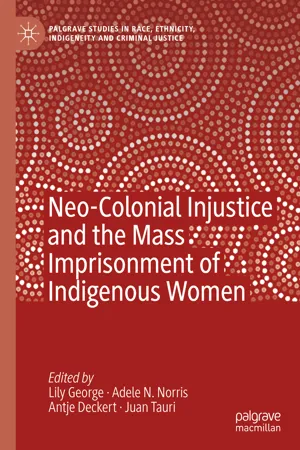Gordon (
2011) states that “Policies of
mass incarceration have been called a ‘waste management prison’ approach … where the problem becomes one of containment and storage, not of
rehabilitation and preparation for
reintegration” (p. 5). Most people know that the United States’
incarceration rate is the highest in the world. Many are also aware that Indigenous people are disproportionately incarcerated in the United States as well as in Australia, Canada, and in Aotearoa
New Zealand (Cunneen & Tauri,
2016) and that the
incarceration of women, in general, is on the rise. Only few people know, however, that Indigenous women represent the fastest-growing segment of the prison population in all four countries, with the
incarceration rate for Indigenous
women in Australia and
New Zealand being higher than that in the United States and Canada (see Table
1.1). Māori
imprisonment has steadily increased from 3% to over 50% since the nineteenth century, and Māori women now make up over 60% of the female prison population (George et al.,
2014).
Table 1.1Scope of Indigenous women imprisonment in Australia, Canada, New Zealand, and the United States
• 1 in 30 Australian women are Indigenous • 1 in 20 Canadian women are Indigenous • 1 in 6 New Zealand women are Indigenous • 1 in 118 United States women are Indigenous |
• 1 in 345 Australian Indigenous women are in prison • 1 in 56 Canadian Indigenous women are in prison • 1 in 334 New Zealand Indigenous women are in prison • 1 in 242 United States Indigenous women are in prison |
• 1 in 86 Australian Indigenous women are under correctional control • 1 in 37 Canadian Indigenous women are under correctional control • 1 in 61 New Zealand Indigenous women are under correctional control |
• Australian Indigenous women are ten times more likely to be in prison than non-Indigenous women • Canadistian Indigenous women are nine times more likely to be in prison than non-Indigenous women • New Zealand Indigenous women are four times more likely to be in prison than non-Indigenous women • United States Indigenous women are three times more likely to be in prison than non-Indigenous women |
It has been over 20 years since Luana Ross (1998) published Inventing the savage: The social construction of Native American criminality in which she advanced the concept of neo-colonial racism to articulate the specific, interwoven strategies of systematic denial of freedom and sovereignty that neo-colonial societies use for the social control of Indigenous peoples. Since Luana Ross’ seminal book was published, Indigenous women’s imprisonment has increased sharply. Voices of Indigenous women detailing specific ways settler colonialism exposes Indigenous women to a system of state-sanctioned violence has been around for several decades, speaking across diverse domains. Such voices are pertinent to elevating the awareness of and advancing the discussion of high imprisonment rates, violence and safety experienced and articulated by Indigenous women, which remain largely invisible in national political discourses. As Indigenous women’s voices and activism engage in strategies of resistance and emancipation, it is the purpose of this volume to capture these voices as they articulate the depth of systemic violence against Indigenous women and the remarkable agency Indigenous women wield in the struggle towards liberation.
Decolonising our futures: Neo-colonial criminal injustice and the mass imprisonment of Indigenous women seeks to contribute to the decolonising, intersectional and comparative literature by addressing issues around the mass incarceration of Indigenous women. As Deckert (2014) has pointed out, a dearth of publications on the subject contributes “to the ongoing marginalisation of Indigenous peoples” because “an inadequate quantity of criminological discourse inhibits public attention to the social problem of disproportionate incarceration rates” (p. 39). Furthermore, Norris (2017) has noted that “the absence of a critical lens toward contemporary forms and experiences of racism undergirding the mass criminalisation of Indigenous people perpetuates a colour blindness that in turn works to normalise mass female incarceration” (p. 2). Therefore, it is both important and timely to examine the contemporary mechanisms that drive the mass imprisonment of Indigenous women and to discuss strategies for grappling with the realities of racism. Luana Ross and other Indigenous scholars have recognised that a thorough examination of the mechanisms that generate and perpetuate neo-colonial racism is required to enable and sharpen resistance to racist practices and policies.
In this edited collection, Indigenous scholars—some jointly with non-Indigenous peers—illuminate how neo-colonial societies continue to deny many Indigenous peoples a life relatively free from state interference as most citizens enjoy it. The book covers three main subject matters. Firstly, it seeks to explain the recent surge in the incarceration of Indigenous women in neo-colonial states. Secondly, it investigates implications that the mass incarceration of Indigenous women has for their children, partners, and whānau/mob/communities. Perhaps most importantly, the book addresses activism, resistance and Indigenous strategies against the mass incarceration of Indigenous women. Over the course of the following 11 chapters, the authors explore how White-settler supremacy is exercised and preserved through neo-colonial institutions, policies and laws, leading to failures in social and criminal justice reform; the impact of women’s incarceration on the...
